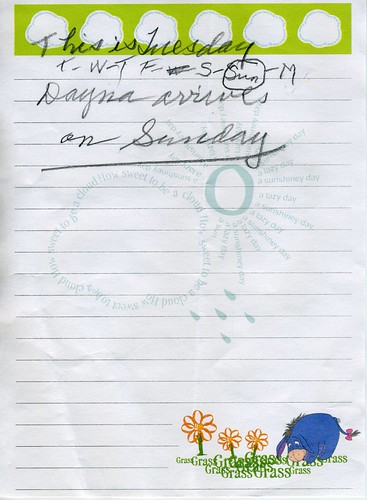
memory
is not an archive
nor does it record
in real time
it lives in the brain
in chemical traces
the traces can fade
can be augmented
our memory
is the fullest record
we have of ourselves
Found in Just Remember This in the New York Review of Books.
While reading Michael Greenberg’s review of Sue Halpern’s Can’t Remember What I Forgot: The Good News from the Front Lines of Memory Research, in which these words appear, through a happy surfeit of turkey and stuffing and pecan pie last night, I began to cry.
A sure indication, I suspect, that the bruise I picked up in Seattle when I saw my grandmother last (when, in her Alzheimer’s, she failed to see me) is still tender.
The note above is in my grandmother’s handwriting. She left it in my rental car when I came to visit the time previous to the last bruising stay -- the time when she knew who I was and I took her to church and sat with her all day Sunday, only to find her surprised to see me (having forgotten our Sunday) when I returned a few days later, my business done, to take her to lunch before saying goodbye.
The note was her cheat sheet. On that visit she was confused as to when I would arrive and returned repeatedly to the front desk of her retirement community to ask if I had come yet -- days before I ever did. She told me the story, laughing, when at last I did arrive, embarrassed that the girl at the front desk was laughing at her with each subsequent visit, thinking her ridiculous.
(Hearing the story, I wanted to bean the girl at the front desk.)
I found her note to herself inside a cheap plastic tote that she insisted on carrying to lunch, and then left behind in my rental car. Finding that there was no article of urgency in her tote (like a wallet) I stuffed it in my bag with the intention of returning it to her by mail. I never did, because of what I saw inside. I hoped instead that she would forget she ever left it.
There was a birthday card, signed by half a dozen dear friends and neighbors. There was an empty envelope from a card once sent by a fellow she dated briefly after my Bompa died. She had circled his return address. There were two ziplock bags, a scattering of rumpled kleenex, and the program from her baby brother’s funeral, seventeen years before.
There was this note, her cheat sheet to herself, written on note paper that I’m certain she picked up because my Bompa had the habit of saying “don’t forget about old Eeyore,” meaning himself, on which she had penciled out this calendar to remind her: This is where I am. This is where I’m going. This is where I will meet my granddaughter.
And there was a clipping, among her crumpled artifacts, of a newspaper article that read: Gene work may yield Alzheimer’s advance.
Which was a little like the horror of finding garlic and a wooden stake among the possessions of a friend who had been carried away improbably by a vampire.
A friend who had earlier feared the very same vampire; who had told others (like her granddaughter) that the vampire was after her, and others (like her granddaughter) had said: Don’t worry. You’ll be fine. You don’t have Alzheimer’s, Grama: You’ve just misplaced your keys.






3 comments:
so sad, so beautifully written. hugs.
I went home for Thanksgiving and experienced first-hand what seemed to be the initial phases of dementia with my mother... so this hit very close to home. So, as I read this, I grieved your loss of a richly deep relationship at the same time I grieved one that never really was.
Amazingly moving, suttonhoo. Thanks for that intimate view into your family. What your grandmother may not remember, she can still know: that you love her very much.
Post a Comment